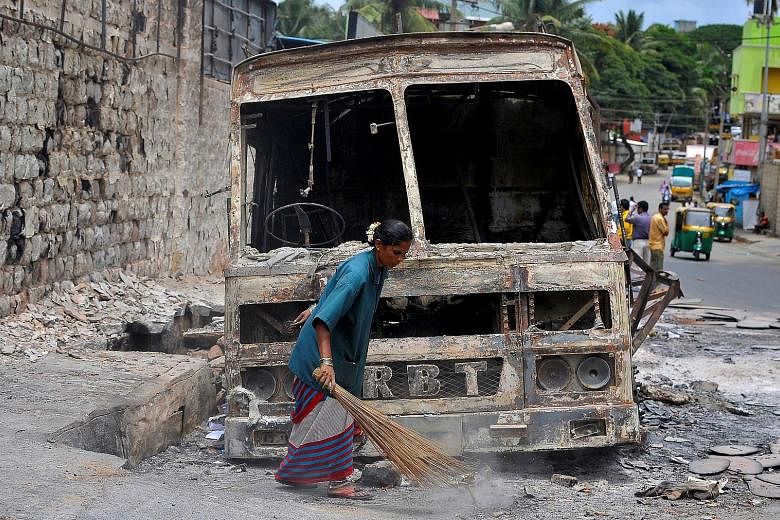BENGALURU • Two days of violence in the Indian city of Bengaluru this week over a water dispute have exposed the growing pains of the dynamic technology hub's chaotic boom.
Oracle employees were at work on Monday when protesters entered their nine-storey building in Bengaluru and asked them to leave in support of demonstrations that had erupted across the city over an inter-state water dispute between Karnataka - of which Bengaluru is the capital - and Tamil Nadu.
By early afternoon, one of the US software giant's biggest overseas offices had been evacuated, two employees there said, as had the Bengaluru premises of dozens of multinationals and Indian firms that stayed shut on Tuesday to ensure staff safety. A spokesman for Oracle in India said no one was available to comment on the incident.
"They come and live here, which means our resources are being used by them. Tomorrow, if there is no water in the city, will they have an office here?" asked 30-year-old local activist Keerthi Shankaraghatta, who led a group that staged peaceful calls to shut down several offices during the protests.
Videos on his Facebook page show employees from companies such as Accenture and ICICI Bank being escorted out of their offices.
Thomson Reuters has more than 4,500 staff in Bengaluru. The company said a significant number of its employees in the city worked remotely on Tuesday, while a small core group worked from its offices.
Bengaluru businesses have faced four days of disruption this month after the water protests and an unrelated strike, hitting operations in a city that accounts for a significant chunk of India's US$97 billion (S$132 billion) in information technology exports.
Despite such experiences, employers said the spasm of violence, in which two people were killed, had done no major damage to the appeal of the southern city.
From a sleepy retirement centre known as "Garden City" in the 1990s, Bengaluru, or Bangalore, has grown to become a sprawling metropolis of 10 million that is home to major offices of firms such as Amazon.com, Dell and local giant Wipro.
Companies leased out top grade office space of more than 7 million sq ft in Bengaluru in the first nine months of 2015, double 2013 levels and more than any other Indian city, according to property consultancy Cushman and Wakefield data.
Reports have emerged that amid the violence, doctors in India smuggled a desperately ill patient across state borders under cover of darkness to receive a liver transplant after the police said violent protests would make an ambulance journey too dangerous.
Police had halted traffic between Tamil Nadu and Karnataka after protesters began torching vehicles. The move forced doctors at a Karnataka hospital to come up with an alternative plan after a liver for transplant became available for their patient at a hospital in Tamil Nadu.
Dr Arikichenin Olithselvan, a doctor at the Manipal Hospital in Karnataka, said they had to wheel the 55-year-old man across the border in a wheelchair before finding a local ambulance to ferry him on to the hospital for the operation.
REUTERS, AGENCE FRANCE-PRESSE

